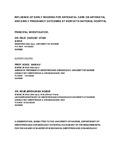| dc.description.abstract | Introduction: The value of antenatal care (ANC) includes enhanced level of knowledge
in preparation for motherhood, early detection of pregnancy related complications and
their corrective and preventive measures. Early booking for antenatal care (<16 weeks)
in Kenya remains low, at 15%. This forms the basis for this study.
Objective: To determine whether mothers who book early experience better birth
preparedness, ANC investigations and pregnancy outcomes compared to those who
book late.
Study Design: A retrospective cohort study, where the exposure of interest was
booking for antenatal care.
Study Setting And Site: Kenyatta National Hospital (KNH) labour ward, antenatal/post
natal wards, renal unit, ICU, and HDU
Study Population: Exposed group had early booking (<16weeks) for antenatal care
while the unexposed had late booking (>28weeks).
Sample Size: A total of 300 participants, 150 for each group.
Data Analysis: Chi square was used to determine association between birth
preparedness, investigations, pregnancy outcomes and categorical variables and ANC
booking. Odds ratio (OR) with 95% C.I and P-value less than 5% were used to test the
strength of association
Results: Late booking was associated with lower odds of birth preparedness evidenced
by: lower knowledge of expected date of delivery (OR 0.26; P=0.005; 95% CI 0.1-0.66),
and lower likelihood of having a birth plan in terms of desired place of delivery, preferred
skilled birth attendant, birth companion, means of transport and blood donor (OR 0.24;
P=0.006; 95% CI 0.09-0.67). Late booking was also associated with lower odds of
emergency preparedness like knowledge of danger signs during pregnancy (OR
0.09;P=<0.001;95% CI 0.05-0.18) and postpartum emergency preparedness like
knowledge of danger signs in puerperium (OR 0.16;P=<0.001;95% CI 0.08-0.33)and
during infancy (OR 0.05;P=<0.001;95% CI 0.03-0.09).Late booking was associated with
lower knowledge on modern family planning methods(OR 0.17;P=0.001;95% CI 0.10.29),
and childhood immunization ( OR 0.1;P=<0.001;95% CI 0.06-0.17). Late
booking was associated with lower likelihood of interventions like: Folic acid supplementation (OR 0.02; P=<0.001; 95% CI 0.01-0.03) and iron supplementation (OR
0.39; P=0.001; 95% CI 0.23-0.66). Women with primary level of education were more
likely to book late compared to those with tertiary education, (OR 1.94; p= 0.033; 95%
CI 1.05-3.57). Late booking was more likely among women residing in rural areas
compared to those in urban areas (OR 0.33; 95% CI 0.11-0.93, p = 0.037). Late booking
was also more likely among unemployed women compared to employed women (OR
0.54; 95% CI 0.31-0.96, p = 0.036). The differences in maternal and early neonatal
outcomes were not statistically significant (OR 3.18; 95% CI 1.00-10.08, P=0.05) and
(OR 0.81; 95% CI 0.45-1.45; P=0.479), respectively.
CONCLUSION: Early booking for ANC tends to confer better birth preparedness, and
better antenatal care interventions compared to late booking. The timing for antenatal
care booking, however, seems not to influence the maternal and early neonatal
outcomes. | en_US |
| dc.description.department | a
Department of Psychiatry, University of Nairobi, ; bDepartment of Mental Health, School of Medicine,
Moi University, Eldoret, Kenya | |

